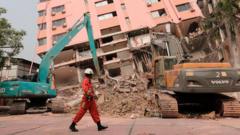Fighting continues in Myanmar as a declared ceasefire aimed at facilitating earthquake relief efforts proves ineffective, prompting calls for unimpeded humanitarian assistance.
Ceasefire Amid Chaos: Myanmar’s Struggle for Peace and Humanitarian Aid

Ceasefire Amid Chaos: Myanmar’s Struggle for Peace and Humanitarian Aid
Despite a temporary ceasefire in Myanmar following a devastating earthquake, violence persists, exacerbating humanitarian needs.
Fighting continues to rage in Myanmar, even as the military junta and an alliance of rebel groups announced temporary ceasefires designed to aid in earthquake relief efforts. Reports received by the UN Human Rights office indicate that the military has executed at least 14 assaults since the ceasefire was declared on April 2. The junta has accused both rebel factions of the alliance of conducting attacks, while one rebel group contended that clashes arose in response to military "offensives."
Maj Gen Zaw Min Tun, the spokesman for the military council, released a statement asserting, "we will respond if military bases are attacked without reason." BBC Burmese's request for further comment from the military spokesman was not answered. UN High Commissioner for Human Rights, Volker Türk, urged a complete cessation of military activities, emphasizing the need to focus on helping those affected by the earthquake and ensuring unfettered access for humanitarian agencies following the powerful 7.7 magnitude quake on March 28.
Since the junta seized power in 2021, Myanmar has endured a brutal civil conflict, pitting the military against various ethnic militias and resistance factions. The death toll from the earthquake has reached 3,564, with over 5,012 injuries reported and approximately 210 individuals unaccounted for. Rescue teams are still pulling bodies from the debris in hard-hit Mandalay, where relief operations are being hampered by rain.
The UN Human Rights office highlighted ongoing challenges in delivering aid, noting that despite some progress in areas where access has been allowed, longstanding military restrictions have left numerous severely affected locations without essential humanitarian assistance, aside from what local residents have been able to organize.
UN humanitarian chief Tom Fletcher, speaking from Mandalay, reported that survivors are in dire need of food, water, power restoration, and shelter. The situation is further complicated by ongoing aftershocks, including a recorded 4.9 magnitude quake over the weekend, leaving many residents traumatized. Prior to the earthquake, almost 20 million people were already facing significant needs in this volatile region, raising concerns about an escalating crisis that compounds existing humanitarian challenges and conflict.


















